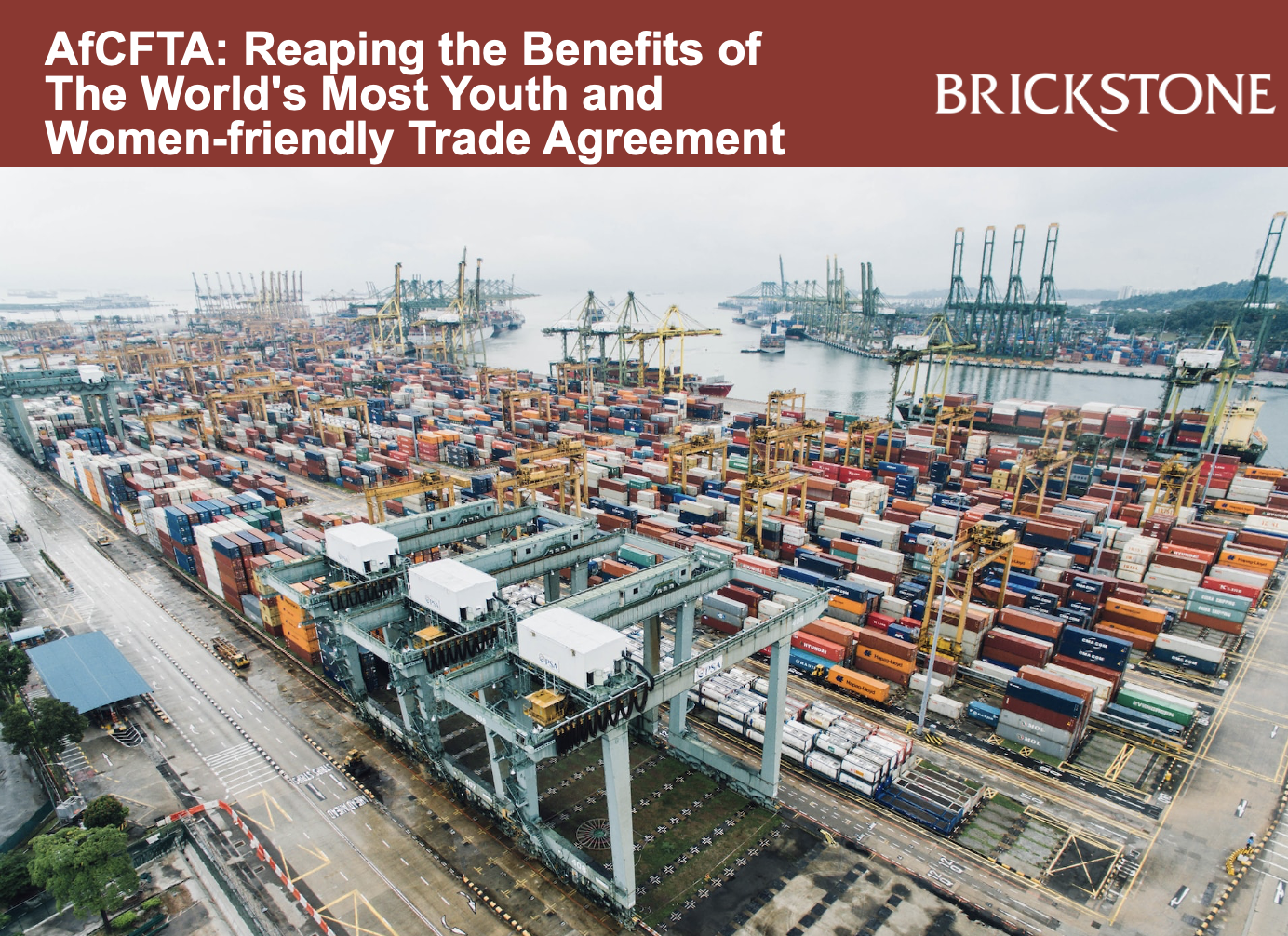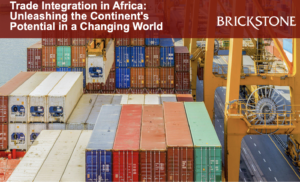AfCFTA: Reaping the Benefits of The World’s Most Youth and Women-friendly Trade Agreement
The African Continental Free Trade Area (AfCFTA) has huge potential to harness the power of women and youth to realize its true potential.
The African Union’s (AU) timely efforts to accelerate the implementation of the AfCFTA is a unique opportunity for the continent to refocus its energy on critical youth and women empowerment interventions. Effective implementation of agreed upon policy instruments by AU member states will transform the continent.
There is no doubt that this landmark continental trade agreement, if driven by women and youth — among the most valuable assets of the continent — will be the primary enabler for unlocking Africa’s immense potential. According to the UN, priority must be given to investments in women and youth in all facets of the AfCFTA implementation arrangements.
This article by Brickstone Africa reviews the UN’s publication on how to fully realize AfCFTA’s benefits and potential in Africa.
AfCFTA’s Potential in Boosting Intra-African Trade
According to the UN, Africa has the world’s youngest population, with over 400 million young people aged 15 to 35 years. To spur Africa’s economic progress and advance SDGs, the critical mass of youth and women remains the main anchor of the AfCFTA, which is the “Agenda 2063,” the continent’s development blueprint.
This massive single continental market is expected to increase intra-African trade by 52.3 percent, deepen continental integration, increase productivity, create more jobs, and avail substantial gender-balanced opportunities by including women and youth in Africa’s trade liberalization. The World Bank estimates that the AfCFTA will increase Africa’s income by $450 billion by 2035 and increase intra-African exports by more than 81 percent.
According to the UN Economic Commission for Africa, this single market trade agreement will enable the African economy to reach the $29 trillion mark by 2050. Africa has a unique opportunity to lift millions of people out of poverty by empowering women and youth to change the continent’s business environment.
Currently, trade and most of the African economy, is not gender-neutral; it remains biased in favour of men due to social inequalities and a disempowering patriarchal culture that subordinates women. As a result of these gender constraints, women are more likely than men to engage in informal trade.
Youth, meanwhile, face difficulties in accessing formal employment and decent jobs, forcing them into entrepreneurship and small businesses in the informal sector.
However, as with the youth, unlocking the potential of cross-border trade is strategically essential to women’s empowerment. In Rwanda, for example, 74 per cent of those engaged in cross-border trade are women, and 90 per cent rely on cross-border trade as their sole source of income.
According to the UN Economic Commission for Africa, this single market trade agreement will enable the African economy to reach the $29 trillion mark by 2050. Africa has a unique opportunity to lift millions of people out of poverty by empowering women and youth to change the continent’s business environment.
While intra-African trade can serve as a catalyst to promote gender equity by improving the financial inclusion of women and youth on the continent, their respective integration into trade policies has been suboptimal.
This poses the risk of this critical trade agreement shifting from being a development instrument to being a primary cause of poverty and inequality, resulting in the continued exploitation of women and youth as sources of low-wage labour, inequitable market prices, and low wages. The AfCFTA should be insulated by incorporating inclusion to avoid disempowerment and marginalization of vulnerable groups.
The AfCFTA Secretariat is implementing all the required protocols to boost the core customs unions and free trade agreements to cover the full range of trade opportunities on the continent, advancing the participation of women and youth in cross-border trade.
The AfCFTA will address the excessively high trade costs and steep tariff barriers in many countries that limit the potential of women and youth in the business sector, ultimately stifling economic growth and undermining the continent’s overall development.
In addition, opportunities to obtain accessible and market-driven credit and finance for formal and informal women- and youth-led enterprises are often limited. This is due to an assortment of reasons: low levels of financial literacy, inaccessible and difficult-to-understand financial information, collateral constraints, lack of variety in financial products, punitive interest rates with limited financing options, and unfavourable loan application procedures.
This is heartening, considering the prominent role women and youth play in Africa’s socio-economic space through the informal sectors that use small and medium-sized enterprises (SMEs) as “special purpose vehicles” for their economic engagement.
A practical and robust solution for the continent rests on increasing access to lifelong learning and financing support, while instituting user-friendly tax products that meet Africa’s current and future needs.
Read complete publication here.






